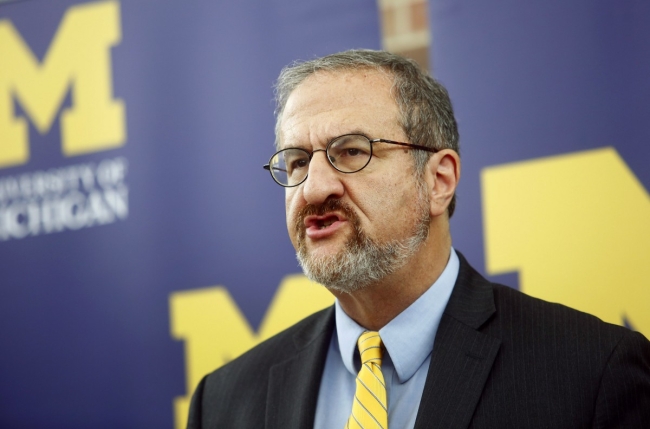You have /5 articles left.
Sign up for a free account or log in.

Mark Schlissel
Getty Images
A federal judge has demanded that the University of Michigan's president appear in his courtroom to address a lawsuit by a student accused of sexual assault.
The order, a highly unusual step, underscores the increased national attention around campus rape investigations and fairness for accused students in the court system. Experts said that they expect judges and lawyers to employ similar legal strategies in the future.
“This is a highly unusual case,” said Laura Dunn, a lawyer and founder of advocacy group SurvJustice.
Michigan officials argued Mark Schlissel, the president, should not have to attend a hearing in June, saying that such duties have historically been delegated to other administrators, that Schlissel is not primarily responsible for the university’s sexual assault rules and that his time was better spent running the state’s flagship institution.
The judge, Arthur J. Tarnow, disagreed.
“Yes, he can delegate,” Tarnow said in a conference call on May 1 with Deborah Gordon, the lawyer representing the accused student, and Josh Richards, the university’s counsel. A transcript of the conference call was included in court documents.
“Obviously, with such a large institution, there are all sorts of delegations made. But I don't think he would characterize himself as a figurehead. And I think he would, and I would agree, that the person down the line in charge of discipline or however it's structured knows more about the day-to-day operation and so on. But that person reports to the president, and the president will be here.”
The undergraduate student first sued in U.S. District Court last June, asserting that the university had violated his due process rights while administrators investigated the sexual assault allegations against him.
The student, named John Doe in court filings, was nearing graduation and had been accepted into a graduate program in Michigan's engineering college, among other programs, when he was accused of assaulting a female student. Doe said the encounter was consensual and that the two continued to communicate after the incident in question.
University officials froze the accused student’s transcripts even before the investigation ended, with no ruling against him, which prevented him from transferring. Tarnow directed the university to release the student’s transcripts. The university never made a determination in the case. In his lawsuit, the student also stated that he had no notice of the allegations against him when he was interviewed by an investigator, and so he was unable to properly respond to major claims.
During the conference call in May, Tarnow insisted that Schlissel appear, telling Richards that as president, Schlissel needed to explain the university’s positions to students, professors, the public and journalists.
When Richards asked if Schlissel could participate in a phone call instead, Tarnow shot him down immediately.
“No. That is an easy question. It's not like you are a plane trip away. I won't tell you how fast I used to be able to get to U of M,” Tarnow said as the two negotiated a date that wouldn’t conflict with Schlissel’s responsibilities.
“Let me say this. This should be more important to him than almost anything going on at the university. I understand the importance of the Board of Regents meeting, and that is why I have no problem giving alternative dates. But I am not sure I would understand anything else being more important than resolving what is a hot-button issue at every university in this country.”
Several days later, the university filed an official motion with the court requesting that Schlissel not have to attend a hearing. The institution wrote in its filing that the court had “exceeded the bounds of its discretion” when another administrator could take Schlissel’s place and that the president “had no duty” to justify the university’s sexual assault policies.
“The court asserts that the university president’s responsibilities require him to 'defend' the university’s sexual misconduct policy, but, respectfully, the court does not define the president’s responsibilities: the regents of the University of Michigan do. The court’s conscription of the university’s president -- an officer of the state -- to perform a task the president would not otherwise be required to perform by the regents is 'fundamentally incompatible with our constitutional system of dual sovereignty' and violates the 10th Amendment,” Richards wrote.
Tarnow turned down the request.
Spokeswoman Kim Broekhuizen provided a statement on behalf of the university.
"Keeping the campus safe is the highest priority of the regents, president and the entire leadership team," the statement reads. "That includes strong, ongoing efforts to reduce the incidence of sexual misconduct. That is very separate from requiring a university president to directly engage in a single settlement conference in a single case brought by a student accused of sexually assaulting another student."
Michigan, the state, has been an epicenter for issues of campus sexual assault.
Last year, in a separate lawsuit against the University of Michigan, the U.S. Court of Appeals for the Sixth Circuit ruled that universities must allow students in these cases -- or their representatives -- to directly question their accuser in a live hearing. This is a particularly unpopular practice among sexual assault survivor advocates -- nevertheless, Michigan changed its policies to fall in line with the ruling, and observers said it had to reshape the court district’s notion of due process.
And Michigan State University for years has grappled with the fallout from Larry Nassar, a former doctor who sexually abused hundreds of women both at Michigan State and in his role as the USA Gymnastics physician. Lou Anna K. Simon, the former MSU president, resigned from her position and was charged with lying to police in their investigation of Nassar, who is currently in jail. Michigan State settled with Nassar’s victims for $500 million.
“Consider that the mood in Michigan with respect to presidents of its public universities is different now as a result of the Nassar case,” said Brett Sokolow, president of the Association of Title IX Administrators. Title IX of the Education Amendments of 1972 is the federal law prohibiting sex discrimination. “Are they respected pillars of their communities or bureaucrats covering up widespread misconduct?”
Institutions in Michigan in particular have been criticized for “siloing,” or delegating duties among administrators so much that “the campus becomes incredibly divided,” said Taylor Parker, a consultant with Safety Advisors for Educational Campuses and a deputy Title IX coordinator at the Ringling College of Art and Design.
Parker said that the court is arguing that the president should be present for the hearing, scheduled for June 11, so that he can make decisions immediately concerning the case and the court can avoid a delay that would come with other administrators getting approval from higher-ups.
“Ultimately I think this speaks to the burden that the courts have been under to litigate, negotiate and settle these types of issues and to preside over enforcement after handing down a ruling,” Parker said, adding that the U.S. Department of Education has become less likely to intervene in sexual assault cases.








